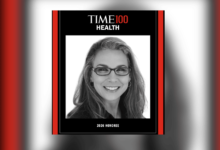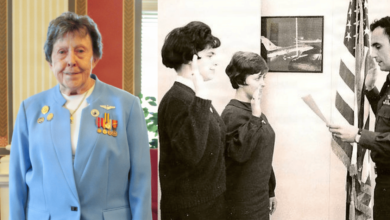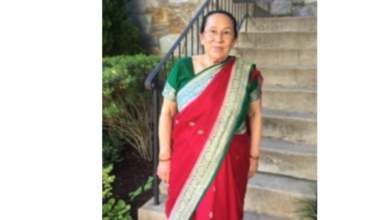Breast cancer survivor urges fellow nurses to check for lumps

A nurse and breast cancer survivor has urged nursing colleagues to regularly check their breasts and surrounding areas for lumps and to see a GP if they are worried about any changes.
To mark Breast Cancer Awareness Month, Sharon Maywood, an endoscopy nurse working in Cambridgeshire, has shared her story with Nursing Times in the hope that it will encourage others to seek help.
At age 40, Ms Maywood decided to have a change in career, moving from accounting to become a healthcare assistant on a gastroenterology ward at Peterborough City Hospital.
“It’s really scary that a nurse, or trainee nurse, would be so blasé about their own health”
Sharon Maywood
Almost two years later, she was placed on a pilot scheme by North West Anglia NHS Foundation Trust, which runs the hospital, to become a nursing associate.
However, part way through her training scheme in 2018, Ms Maywood noticed a lump on her breast, which she said she “initially dismissed”.
“I was quite blasé about it,” she told Nursing Times.
“I thought it was part of my menstrual cycle.
“But within three weeks my husband had dragged me down to the doctors and within about a month or so I’d had the lump out and they’d taken some of my lymph nodes out.”
Ms Maywood was diagnosed with HER2-positive breast cancer, which meant she had to have chemotherapy, radiotherapy and trastuzumab treatment – a medicine, sold under the brand name Herceptin, which targets HER2 to block its negative effects.
However, she did not let her diagnosis stop her from pursuing her career as a nursing associate, as she continued with her training while she was having treatment.
“I wanted to qualify with my cohort,” she said.
“I was determined [that] my cohort was not going to leave me behind.”
By carrying on with her nursing associate training it gave her “something to focus on” aside from having cancer treatment, said Ms Maywood.
“I think that’s possibly another reason why I got through everything so much easier because I had something to focus on [and] and something to aim for,” she said.
Ms Maywood described how she would do her shifts early in the week before her chemotherapy session and then would have days off afterwards to recover.
Meanwhile, when she moved onto having radiotherapy treatment, she would arrange to have it first thing in the morning so she could begin her shift at 10am.

Sharon Maywood ringing a bell to mark a milestone in her cancer treatment
“Work were so supportive,” she said.
“The trust was so supportive that it was more the after-effects of the chemo that made me want to give up, not the stress of work.”
Ms Maywood qualified as a nursing associate in 2019, the year she finished her Herceptin treatment for breast cancer.
She then applied for a two-year top-up course to become a registered nurse, and in 2021 she started as a staff nurse at Peterborough City Hospital.
Now, Ms Maywood is working as a nurse in the endoscopy department at Hinchingbrooke Hospital, also part of North West Anglia NHS Foundation Trust.
This year, she had her five-year all clear mammogram, which she described as a “huge milestone”.
However, she said she often reflects on how different her circumstances could have been if she had got the lump checked out any later.
“It’s really scary that a nurse, or trainee nurse, would be so blasé about their own health,” said Ms Maywood.
She urged fellow nurses – as well as members of the public – to always go and get any new lumps checked out.
Ms Maywood said: “Please check your breasts and, if you feel something, don’t delay it because a delay could result in something very different as an outcome.”
She added: “It’s so important because depending on what type of cancer you have it can [spread] fast.
“By the time you’ve built up the courage, or by the time you can be bothered to go and get it checked out, it could be that it’s too late.”






